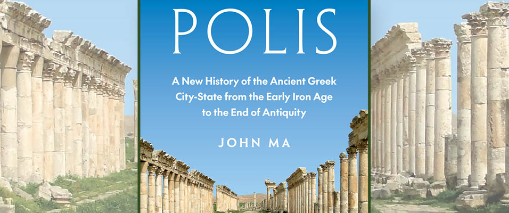
Celebrating Recent Work by John Ma
Polis: A New History of the Ancient Greek City-State from the Early Iron Age to the End of Antiquity
by John Ma
The Greek polis, or city-state, was a resilient and adaptable political institution founded on the principles of citizenship, freedom, and equality. Emerging around 650 BCE and enduring to 350 CE, it offered a means for collaboration among fellow city-states and social bargaining between a community and its elites—but at what cost? Polis proposes a panoramic account of the ancient Greek city-state, its diverse forms, and enduring characteristics over the span of a millennium.
In this landmark book, John Ma provides a new history of the polis, charting its spread and development into a common denominator for hundreds of communities from the Black Sea to North Africa and from the Near East to Italy. He explores its remarkable achievements as a political form offering community, autonomy, prosperity, public goods, and spaces of social justice for its members. He also reminds us that behind the successes of civic ideology and institutions lie entanglements with domination, empire, and enslavement. Ma’s sweeping and multifaceted narrative draws widely on a rich store of historical evidence while weighing in on lively scholarly debates and offering new readings of Aristotle as the great theoretician of the polis.
About the Author
John Ma is a Professor of Classics at Columbia University. He is the author of Statues and Cities: Honorific Portraits and Civic Identity in the Hellenistic World, Antiochos III and the Cities of Western Asia Minor, and numerous articles on ancient history. His main interests lie in the history of the ancient Greek world and its broader context (including the ancient near-east). Within Greek history, he is particularly interested in the handling of epigraphical and archaeological evidence, historical geography, and the complexities of the Hellenistic world. His research tries to combine philological attentiveness (especially in the case of Greek inscriptions), interpretive awareness (for literary but also documentary evidence), groundedness in materiality and concrete space, and a feeling for legal, social, and economic realities.
Register for in-person HERE.
Register for Zoom HERE.
